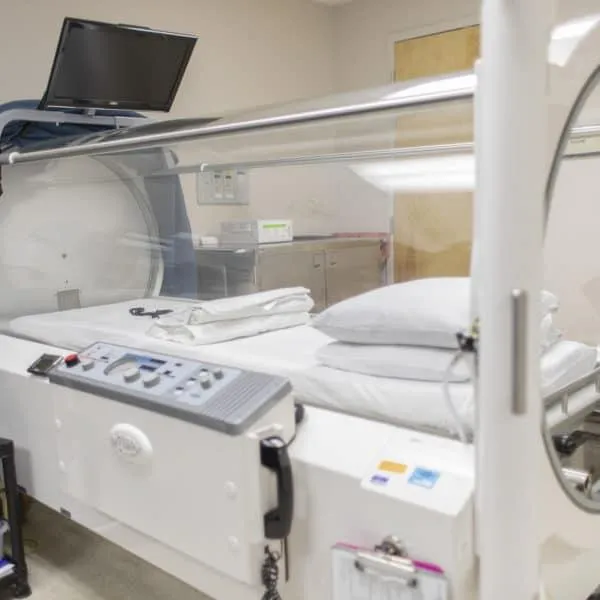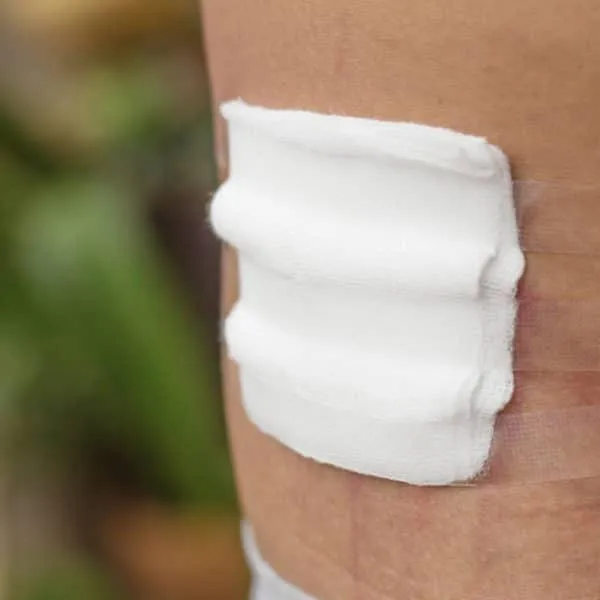Wound Care for Cancer Patients: Expert Treatment and Healing
Many cancers can cause a skin ulcer. These ulcers are called cancerous ulcers. Some chronic wounds can turn into cancerous ulcers. These include burns, radiation and venous wounds.
Find a Wound Care Center ® Near You
If you or a loved one is struggling with a wound that won’t heal, a Healogics Wound Care Center can help. Since there is no need for a referral, your treatment is only a click and call away.
Home»Diabetes and Wound Healing

Malignant and Atypical Wounds: Diagnosis and Treatment
What is a malignant wound? Many cancers can cause a skin ulcer. These ulcers are called malignant ulcers or cancerous ulcers. Some chronic wounds can turn into cancerous ulcers. These include burns, radiation and venous wounds. Malignant wounds require specialized care and attention to prevent further complications and promote healing. What is an atypical wound?…
Cancer Patient Resources

Hyperbaric Oxygen Therapy (HBO)
Hyperbaric oxygen therapy (HBOT) is a treatment that increases the amount of oxygen blood cells can carry. It has been used for more than 70 years to improve healing in tissues deprived of oxygen. Studies show it significantly improves healing for some types of chronic wounds.

Ulcer Wound Care: Best Practices for Optimal Healing
At Healogics, we know that managing a wound properly is essential for healing and preventing complications. More than 6 million Americans live with chronic wounds, significantly impacting daily activities, mobility, and overall well-being. Whether you’re caring for a diabetic foot ulcer, pressure injury, or another type of wound, following the right care procedures is vital…

Nutrition and Wound Healing: Expert Strategies
The Critical Role of Nutrition in Wound Healing
When most people think about wound recovery and wound management, they picture dressings, antibiotics, or maybe even surgical interventions. But there’s one powerful healing tool that often gets overlooked: nutrition. The connection between nutrition and wound healing is profound, and at Royal Wound Care, we believe that healing should treat the whole person—not just the wound. That means nourishing the body from the inside out with the right foods and supplements to fuel optimal recovery.
Many underestimate how integral proper nutrition is to the entire healing journey. From forming new tissue to strengthening the immune response, the body requires a steady supply of nutrients to meet its nutritional needs and operate at its best. Without them, healing slows, complications arise, and overall wellness can decline. Think of your body like a construction site: without bricks, mortar, and workers, no repairs can be made. Nutrients are the materials your body needs to rebuild.
Nutrition and Wound Healing
Healing is more than just a biological process; it's a complex, energy-demanding journey that involves cell regeneration, collagen synthesis, inflammatory response, inflammation control, and infection prevention. All of these require essential nutrients. Each stage of wound healing—hemostasis, inflammation, proliferation, and remodeling—relies on specific vitamins, minerals, and macronutrients.
In the inflammatory phase, the body sends white blood cells to the injury site, a process that demands strong immune function and antioxidants, including arginine. During the proliferative phase, collagen and new tissue are built—requiring protein, vitamin C, and zinc. In the remodeling stage, skin structure and strength are restored, where vitamin A and amino acids play vital roles. Without these nutrients, the process stalls, becomes inefficient, or can even reverse.
Without proper nutritional support, even the most advanced wound care treatments can fall short. In fact, poor nutrition can lead to:
Delayed wound healing, as the body lacks materials to rebuild damaged tissue
Increased risk of infection due to impaired immune function
Weakened immune response, making it harder to fight off bacteria and viruses
Loss of muscle mass and mobility, particularly in elderly or bedbound patients
This is why nutritional support for wound patients is not optional—it's critical.
Related: Common Wound Care Mistakes

Foods for Wound Recovery
Eating the right foods provides your body with the essential nutrients needed to support wound healing. These foods are the best way to fuel the repair process, strengthen the immune system, and reduce inflammation, all of which contribute to faster recovery and fewer complications.
Incorporate a variety of nutrient-rich foods to ensure a balanced intake:
Lean proteins like chicken, turkey, eggs, and tofu
Bright-colored fruits and vegetables rich in antioxidants
Whole grains to maintain energy levels and include healthy snacks.
Nuts and seeds for healthy fats and zinc
Dairy or dairy alternatives for calcium and vitamin D
Hydrating fluids including water, herbal teas, and broths
Meal planning is essential. Consider working with a registered dietitian to create a wound-healing meal plan that’s tailored to your dietary needs, cultural preferences, and medical conditions.
Wound Healing Nutrients That Promote Faster, Safer Recovery
Certain nutrients are especially critical to the wound healing process. Without them, healing may be incomplete or delayed. The most essential wound healing nutrients include:
Protein
Vitamin C
Zinc
Vitamin A
Calories
Hydration (Water)
Each plays a unique role in tissue regeneration, immune function, and inflammation control. Deficiencies in hydration and dehydration can compromise healing and lead to chronic wounds or secondary infections.
Let’s break down each one.

Role of Protein in Wound Healing
One of the most crucial wound healing nutrients is protein. It supports:
Collagen production
Immune function
Tissue regeneration
Getting enough protein is essential as it is a macronutrient, meaning it is required in large amounts. It not only supports the repair of damaged skin and tissue but also aids in the creation of enzymes and hormones involved in wound healing. A lack of protein can result in prolonged healing time, a greater risk of infection, and even muscle loss.
Best sources: Lean meats, poultry, fish, eggs, dairy, legumes, tofu, and high-quality protein supplements (as advised by a healthcare provider). Patients with wounds may need 1.2 to 2.0 grams of protein per kilogram of body weight per day, depending on the severity and type of wound.
Did You Know? The role of protein in wound healing becomes even more vital in older adults and post-surgical patients who may experience muscle wasting. In some cases, protein needs can be double those of healthy individuals.
Zinc: The Cellular Repair Specialist
Zinc is essential for multiple aspects of the healing process. It supports:
Cellular repair and tissue growth
Immune function
Enzymatic reactions
Wound closure
A deficiency in zinc can lead to slower epithelialization, increased susceptibility to infection, and prolonged wound presence. Zinc also plays a role in collagen synthesis and inflammation regulation, both vital for efficient healing.
Best sources: Shellfish (especially oysters), red meat, poultry, whole grains, beans, nuts, and seeds. Supplementation may be necessary in individuals with low zinc levels or in those with chronic wounds.

Best Vitamins for Skin Repair
Vitamins play an essential role in helping the skin regenerate and protect against further damage. The best vitamins for skin repair include:
Vitamin C – Helps produce collagen and acts as a powerful antioxidant.
Vitamin A – Supports epithelialization and modulates inflammation.
Vitamin E – Contributes to cell membrane repair and has antioxidant properties.
Vitamin D – Important for immune modulation and inflammation control.
These vitamins help restore skin integrity, reduce oxidative stress, and speed up wound closure. Inadequate intake may result in prolonged open wounds or poor-quality healing.
Sources include: Citrus fruits, leafy greens, sweet potatoes, nuts, seeds, fatty fish, and fortified dairy products. In some cases, supplements may be necessary to meet recommended levels.
Calories: The Fuel for Healing
Calories are the body’s primary source of energy, and during wound healing, your body’s energy demands increase significantly. Calories are necessary to:
Support the energy-intensive repair process
Maintain lean body mass
Promote protein synthesis
Reduce the risk of catabolism (muscle breakdown)
Without sufficient caloric intake, the body may start breaking down muscle for energy, delaying healing and compromising immune response.
Best sources: Whole grains, healthy fats (like avocados and olive oil), starchy vegetables, nuts, seeds, and protein-rich foods. For some patients, high-calorie oral nutrition supplements may be prescribed.
Related: What To Eat To Speed Up Wound Healing
Nutritional Support for Wound Patients
At Royal Wound Care, we understand that no two wounds—or patients—are the same. That’s why we offer personalized nutritional support for wound care management and patients to meet individual needs. This approach ensures optimal healing outcomes, especially for those with chronic wounds, diabetes, surgical recovery, or age-related nutritional challenges.
Our support includes:
Full nutritional assessments
Customized meal and supplement plans
Ongoing education and support
Collaboration with your medical team
We address any underlying deficiencies, ensure adequate caloric and protein intake, and help patients manage other conditions that may affect healing. Whether you're dealing with a pressure ulcer, diabetic wound, or surgical incision, our integrated care model supports healing from every angle.

How Royal Wound Care Heals from the Inside Out
We take a multidisciplinary approach to healing that integrates clinical wound care with expert-led nutritional support, focusing on the individual's nutritional status. Our care team includes wound care specialists, dietitians, physicians, and therapists, all working together to create a comprehensive recovery plan.
Our patients receive:
Full nutritional assessments
Customized meal and supplement plans
Coordination with primary care and specialists
Ongoing monitoring to ensure optimal outcomes
From initial assessment to full recovery, we ensure that every patient gets the best vitamins for skin repair, optimal hydration guidance, and dietary recommendations tailored to their lifestyle and medical condition.
Because healing isn’t just skin deep—it starts at the cellular level, fueled by the nutrients your body consumes every single day. This inside-out approach helps reduce healing time, minimize complications, and improve overall quality of life.
Book a Consultation with Royal Wound Care
If you or a loved one is managing a wound, don’t underestimate the impact of nutrition. Let us support your recovery from every angle.
Our experts are ready to help you take the next step in your healing journey with evidence-based care and personalized nutrition strategies.
📍 Schedule your appointment today and let’s start building a stronger, faster, and more complete healing journey—from the inside out.
Frequently Asked Questions
What role does protein play in wound healing?
Protein plays an important role in the wound healing process. It supplies the amino acids needed for collagen production. Collagen is a vital protein that helps in the repair of body tissue and tissue growth. Protein also supports immune function, which is essential for fighting off infections while healing.
Can vitamins and supplements speed up healing?
Vitamins, especially vitamin C and vitamin C supplementation, along with some supplements can help in different stages of wound healing. They assist with making collagen, controlling inflammation, promoting angiogenesis, and encouraging cell growth. However, good sources of vitamin C deficiency can affect their effectiveness, and they work best when you eat a balanced diet. It's important to talk to a healthcare provider about using them.
WEST HILLS
7230 Medical Center Dr. Suite 100
West Hills, CA 91307
(818)–660–2977
BEVERLY HILLS
9735 Wilshare Blvd #210B
Beverly Hills, CA 90212
(818)–660–2977
If you are interested in making an appointment, please click here to find a Wound Care Center near you.
Request an Appointment at a Royal Wound Care Facility near you.
Royal Wound Care is the expert in wound healing. Our board-certified wound care specialists are ready to help you begin your healing journey. Click the button below to request an appointment at a Wound Care Center near you—no referral needed
© 2025 Royal Wound Care, LLC. All rights reserved.
site by Growth Partners Marketing

